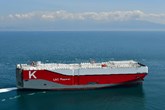There is a visible change towards LNG technology in Poland, DUON drives these changes
Published by Lauren Fox,
Digital Administrator
LNG Industry,
Europe is facing a serious challenge to reduce carbon dioxide emissions and, consequently, achieve climate neutrality by 2050. Krzysztof Kowalski, CEO of DUON Dystrybucja sp. z o. o, describes his thoughts on achieving such goals.

Krzysztof Kowalski, CEO of DUON Dystrybucja sp. z o. o
Europe is facing a serious challenge to reduce carbon dioxide emissions and, consequently, achieve climate neutrality by 2050. The key factor seems to be withdrawing from coal. How does it look in practice? Krzysztof Kowalski, CEO of DUON Dystrybucja sp. z o. o, describes his thoughts on achieving such goals.
“Absolutely yes, especially in the segment of enterprises, including the production sector, which is responsible for a significant fraction of greenhouse gas emissions. We decided to check the status of preparations of Polish entrepreneurs for decarbonisation, especially in the face of the MCP directive and the Green Deal. The results of the study conducted with the Keralla agency ‘Energy transformation among Polish production companies’ show that for almost half of the surveyed representatives, resigning from coal seems to be revolutionary. The results also show that as much as 85% of enterprises have not started the process yet, but it is crucial that as many as two-thirds of them have already established an action plan. Polish entrepreneurs are aware of the changes that await them in the near future and have already taken steps towards decarbonisation. This is an optimistic conclusion.”
One of the inevitable steps on the way to zero emission is introducing LNG as a supportive fuel. What does Polish awareness look like regarding the benefits of its usage?
“Way better. Polish entrepreneurs are noticing the advantages of switching to gas. Among the benefits, the key ones are higher efficiency, potential savings resulting from automation, while reducing costs related to coal storage and service. Reliability, availability, and positive company image (as a company that resigns from coal) are additional arguments ‘for’. LNG is also primarily ‘clean energy’. The fact that gas can be a significant step towards zero emission is visible in the data from the aforementioned study. Over 74% of respondents, who consider decarbonisation, take into account switching to gas indeed. At DUON, thanks to our experts’ knowledge and 20+ years of experience, we want to facilitate this path.”
.png)
What is the role of end consumers in this process?
“It is more and more meaningful. We think consumer awareness is an increasingly crucial factor that drives these changes. Consumers pay attention to the carbon footprint generated during production. Using an example from the food industry – this applies to all product life stages, from packaging production, through the supply chain and, certainly, product production and processing. Hence, more and more often there can be detailed information found on the packaging regarding the carbon footprint. One example of conscious consumer trends is looking for local products. It is associated not only with a lower carbon footprint due to lower transport emissions, but also with valuable support for local business. Against the backdrop of this, reducing the emission of greenhouse gases into the atmosphere by switching to gas fuel becomes even more important.”
The use of LNG in manufacturing companies from various industries is a key factor on the way to reduce gas emissions. Nevertheless, a lot also depends on other sectors, including transport, which is currently responsible for around one-quarter of global CO2 emissions.
“Driving LNG fleets is the first step towards zero emission transport, and it is also an important gas fuel in electrification. There is a significant increase in LNG-powered trucks interest in Poland. This is proved by the registration statistics for vehicles over 3.5 t powered by LNG. According to data, only 15 such vehicles were registered in 2019, last year the number was 650, and in the first half of 2021 – as much as 655.

“What is worth emphasising is the fact that, at the same time, there is a growing share of LNG-powered, brand-new vehicle registrations. In 2019, it was imperceptible at the level of 0.1%. A year ago, the percentage was 3%, while this year – as much as 4%. We want to set a positive example by following this trend. At the beginning of 2021, we equipped the company with five tractors powered by LNG, and in July, our fleet was expanded by another five. Finally, our goal is to achieve full transition to a low-emission fleet.”
At the other end of the spectrum, the entire transport sector, not only the Polish one, struggles with difficult situations due to rising fuel prices.
“On the one hand, there are significant increases in fuel prices (including diesel, whose prices are record-breaking in Europe), and on the other hand, there are increasingly restrictive emission standards. In this situation, withdrawing from traditional diesels is just inevitable. LNG will become an industrial standard in the next few years not only in the European Union but all over the world. In addition, the high position of Polish heavy transport compared to other EU countries may be a driving force for the development of the country's LNG infrastructure. This will help to protect the environment.”
Read the article online at: https://www.lngindustry.com/special-reports/04012022/there-is-a-visible-change-towards-lng-technology-in-poland-duon-drives-these-changes/
You might also like
‘K’ Line receives LNG-fuelled car carrier
An LNG-fuelled car carrier with a capacity of 6900 vehicles has been delivered to Kawasaki Kisen Kaisha, Ltd.

